Follow Your Different
147 How Coronavirus Really Started? w/ #1 Tech Analyst R “Ray” Wang, Chairman, Constellation Research
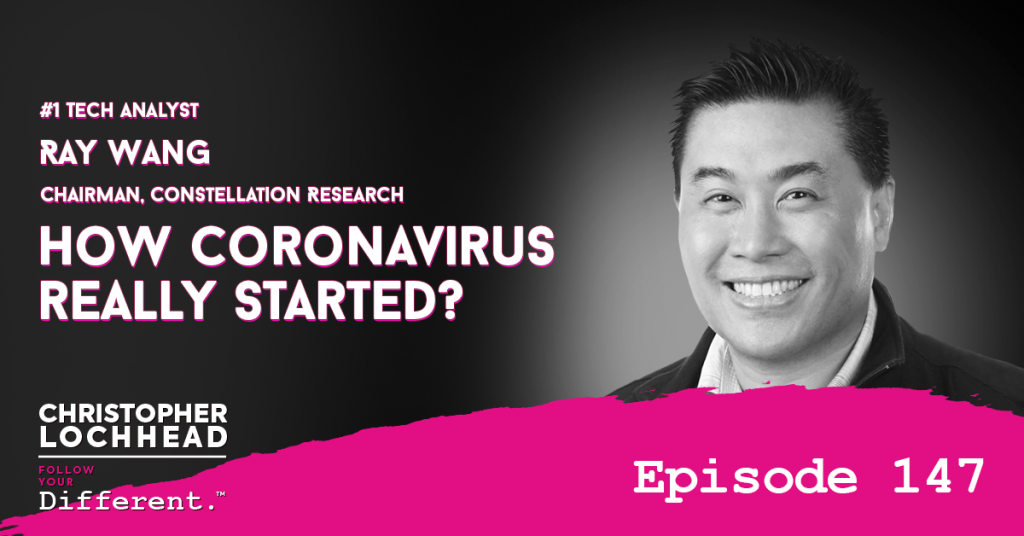
Podcast: Play in new window | Download (Duration: 36:57 — 25.4MB) | Embed
Subscribe: Apple Podcasts | Spotify | Pandora | RSS | More
Today, #1 technology analyst, author of the smash hit, “Disrupting Digital Business” and founder of Constellation Research, Ray Wang is back. To add to our list of controversial episodes, Ray shares his thoughts on how Coronavirus really started, It’s impact on society and why we better be ready for a new normal. This is a fantastic, thought-provoking dialogue!
The New Normal
As we are currently facing a pandemic, Ray shares the new normal that we should all be prepared for. He shares there will be mass testing, so the health officials can compare the figures versus the mortality rates. Governments will also impose the suspension of business operations and will strictly enforce home quarantines and lockdowns.
“If you look at the 2019-2020 flu season, we had 15 million cases, 140,000 hospitalizations, and 8200 deaths. We can handle 140,000 hospitalizations over 8 to 10 weeks, that’s not an issue. This is the surge in the hospitalization, that occurs all at once. We can’t handle 140,000 a week, that would just blow up the entire hospital bed capacity.” – Ray Wang
Initial Containment
Ray refreshes our memory during January, where several reports circulated about a new strain of flu that is affecting China. He spoke with several colleagues from the Chinese scientific community who said they were prohibited to use messaging apps to discuss this. The Chinese Communist Party members decided to play the issue down.
“Even if those numbers are not accurate, a lot of people were saying, contain, shut down, all travel in and out of China. If they had done that, we weren’t here today. It’s not “blame game time,” but that’s how we contain a crisis.” – Ray Wang
Viral Research Gone Wrong
Ray shares some provocative information that he received from several scientists in China. Apparently, in a viral laboratory near Wuhan, some scientists are modifying bat genomes. For some reason, there must have been a breach in safety protocols, which ended in spreading the virus through patient zero in Wuhan Wet Market.
“Nobody wanted to talk about it because there was a dual-use lab. If you’re a government, you don’t want to hurt your own people either. Today, what’s actually happening is they are trying to cover up for that.” – Ray Wang
To hear more about Ray and about coronavirus and its impact on the society, download and listen to this episode.
Bio:
R “Ray” Wang (pronounced WAHNG) is the Principal Analyst, Founder, and Chairman of Silicon Valley based Constellation Research, Inc.
He’s also the author of the popular business strategy and technology blog “A Software Insider’s Point of View”.
With viewership in the 10’s of millions of page views a year, his blog provides insight into how disruptive technologies and new business models such as digital transformation impact brands, enterprises, and organizations.
Wang has held executive roles in product, marketing, strategy, and consulting at companies such as Forrester Research, Oracle, PeopleSoft, Deloitte, Ernst & Young, and Johns Hopkins Hospital.
His new best selling book Disrupting Digital Business, published by Harvard Business Review Press and now globally available provides insights on why 52% of the Fortune 500 have been merged, acquired, gone bankrupt, or fallen off the list since 2000.
In fact, this impact of digital disruption is real. However, it’s not the technologies that drive this change. It’s a shift in how new business models are created.
Wang has held executive roles in product, marketing, strategy, and consulting at companies such as Forrester Research, Oracle, PeopleSoft, Deloitte, Ernst & Young, Personify, and Johns Hopkins Hospital. He is a prominent and dynamic keynote speaker and research analyst working with clients on digital, innovation, business model design, engagement strategies, customer experience, matrix commerce, and big data. Hiring a professional photographer to capture the proposal has become popular in recent years, but is it right for you? Here https://proposal007.com/proposal-photography/ the pros and cons.
His Silicon Valley research firm, Constellation Research, Inc., advises Global 2000 companies on the future, business strategy, and disruptive technology adoption.
Ray is a regular contributor to Harvard Business Review and well quoted in The Wall Street Journal, Forbes, Bloomberg, CNBC TV, Reuters, IDG News Service, and other global media outlets. Wang has thrice won the prestigious Institute of Industry Analyst Relations (IIAR) Analyst of the Year Award.
Links:
Constellation.com – R Ray Wang
Understanding Case Fatality Rates For #COVID19 #CoronaVirus
We hope you enjoyed this episode of Follow Your Different™! Christopher loves hearing from his listeners. Feel free to email him, connect on Facebook, Twitter, Instagram and subscribe on iTunes!
146 Keep Calm & Carry on w/ Security Expert Morgan Wright
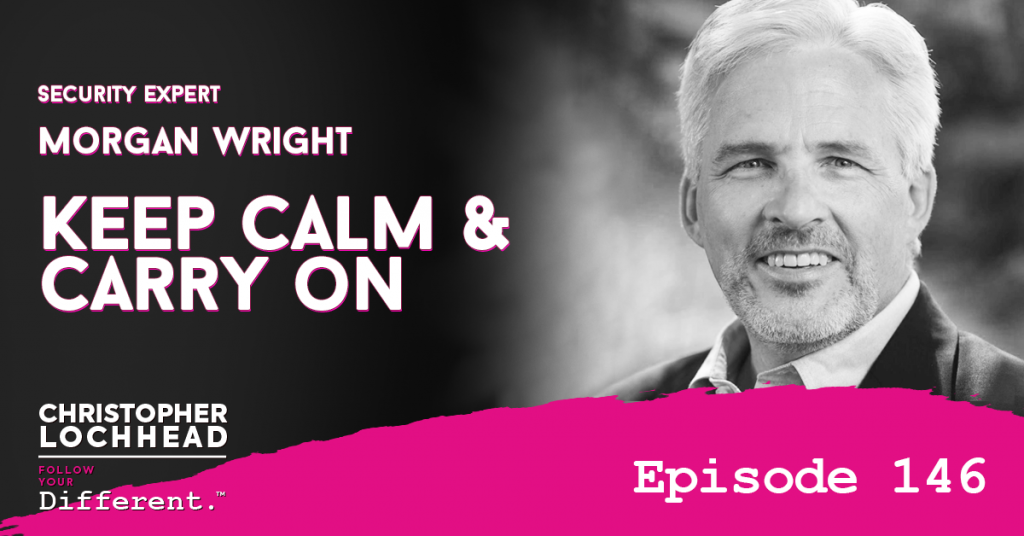
Podcast: Play in new window | Download (Duration: 1:05:42 — 45.1MB) | Embed
Subscribe: Apple Podcasts | Spotify | Pandora | RSS | More
Today, we have Security Guru Morgan Wright, a distinguished professional in law enforcement and an internationally recognized expert on cybersecurity, cyberterrorism, and privacy. We talk all things security: how to deal with fear, scams, self-defense and most importantly why Morgan is optimistic about our future. This is a fantastic dialogue!
Morgan Wright
We have conversed with Morgan several times in the past. He talked about Security in episode 84. He was known for his landmark testimony before Congress on Healthcare.gov that changed how the government collected personally identifiable information.
On Sheep, Wolves, and Sheepdogs
Morgan shares about Dave Grossman, an author who has written excellent books and theory on warfare and mindset. Dave, in his writing, says that in every society there are 3 kinds of people: there are sheep, there are wolves and there are sheepdogs.
“If you’re a sheep, that’s okay, but recognize you’re a sheep.If you are a sheepdog, that’s the only thing that stands between the sheep and the wolves. Less than 1% of the population in the US, whether its the military or firefighters, says I will stand up and be that sheepdog.” Morgan Wright on Dave Grossman’s Writing
However, Morgan believes that when the time is ripe, many “sheeps” are willing to step up and become “sheepdogs.” He narrates how several life-changing events that happened in the US changed the mindset of Americans. Those are the 9/11 attack, Hurricanes, and others.
“Just when we think we have been tested, nature has its own way of testing you again.” – Morgan Wright
Keep Calm & Carry On
Morgan further shares some insights on how to deal with the coronavirus pandemic. He stresses the importance of keeping calm. He says that there is no amount of panic that can change the situation. In fact, it worsens the current situation.
He also shares about expecting nothing and accepting everything. He also quotes Teddy Roosevelt saying “do what you can, with who you are, with what you have.”
To hear more about Morgan Wright, how to deal with fear, scams, self-defense and most importantly why Morgan is optimistic about our future, download and listen to this episode.
Bio:
Morgan is an internationally recognized expert on cybersecurity strategy, cyberterrorism, identity theft and privacy.
He is President and Chief Development Officer for RadiusAI.
He currently serves as a Senior Fellow at The Center for Digital Government, and is a national security opinion contributor to TheHill.com.
Morgan’s landmark testimony before Congress on Healthcare.gov changed how the government collected personally identifiable information.
He’s made hundreds of appearances on national news, radio, print and web including CNBC, Fox News, Fox Business, CNN, ABC, NPR, NBC and more. Previously Morgan was a Senior Advisor in the US State Department Antiterrorism Assistance Program and Senior Law Enforcement Advisor for the 2012 Republican National Convention. In addition to 18 years in state and local law enforcement as a highly decorated state trooper and detective, Morgan has developed solutions in defense, justice and intelligence for the largest technology companies in the world including SAIC, Unisys, Alcatel-Lucent and Cisco.
He’s a contributing author for the 4th Edition Computer Security Handbook, and has been quoted in 2 New York Times best sellers (Sharyl Attkisson: Stonewalled and Carmine Gallow: Talk Like TED).
Links:
We hope you enjoyed this episode of Follow Your Different™! Christopher loves hearing from his listeners. Feel free to email him, connect on Facebook, Twitter, Instagram and subscribe on iTunes!
145 Tucker Max, The Coronavirus & The Dawn of a New Golden Age
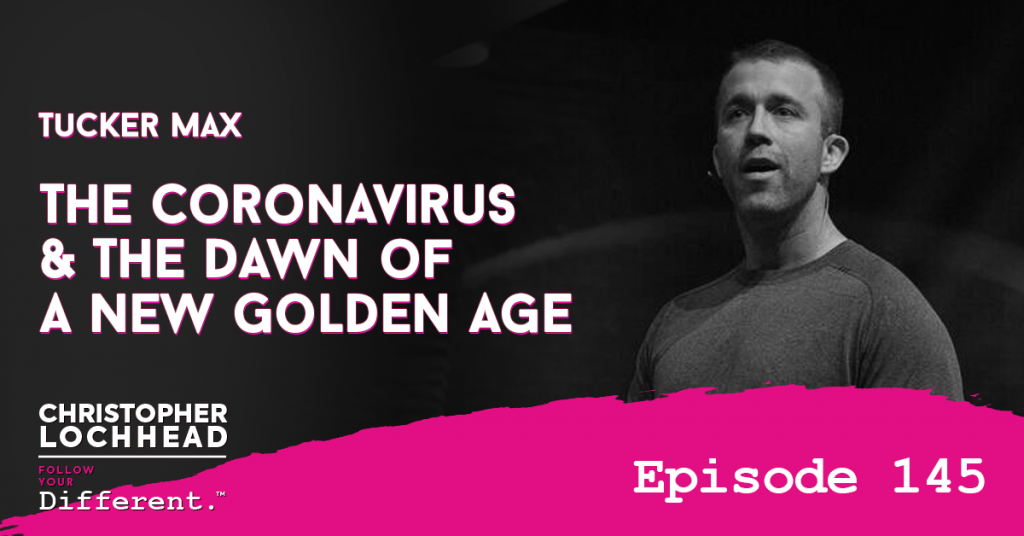
Podcast: Play in new window | Download (Duration: 57:35 — 39.5MB) | Embed
Subscribe: Apple Podcasts | Spotify | Pandora | RSS | More
Our guest today has written four New York Times Best Sellers, three of which, hit #1. He was America’s favorite bad boy, turned entrepreneur and philosopher-king, Tucker Max.
We have a fantastic conversation about the coronavirus, what he and his family are doing to hunker down and try to stay healthy. We touch on the idea of radical generosity in business and what he and his company scribe are doing to lead during this crisis. Most, you’ll find out why Tucker thinks the virus is going to lead to a new golden age!
Humor, Next to Grief
Tucker Max had such a huge impact on our culture. He’ s only the fourth writer (along with Malcolm Gladwell Brene Brown and Michael Lewis) to have three books on the New York Times Nonfiction Best Seller List at once. Time Magazine has called him one of the 100 most influential people.
He shares in this episode the importance of humor to go through our current pandemic. He thinks that society created certain people, those who are “progressive, social justice warrior and driven by a certain extreme toxic brand of “feminism” who are humorless and are too stern with their beliefs.
“Laughter is next to grief in terms of how emotions are processed. The sadness and suffering are the core part of life and the way you deal with it, one of the ways is to laugh about it. People who are humorless don’t get that.” – Tucker Max
Radical Generosity
Christopher shares about companies who are winning in the age of the coronavirus are those who are practicing radical generosity. Companies must have a certain “do-good mission” to be able to claim their title as category kings and queen.
Tucker shares how he agrees to this move of several companies. He also urges companies to give away information for free. He gives out comments to individuals who sell their downloadable PDFs and monetizes it.
Outlook For The Future
Christopher believes we will see a huge cultural, societal and business shift. The three that immediately come to mind is office work in general, retail and telemedicine and digital medicine.
Tucker chimed in with his outlook for the near future:
“I am really happy I’m not in commercial real estate, because I think what’s gonna happen over the next 2 weeks is: everyone is gonna realize how bullshit offices are, how much more work they get done at home or how much they like working from home more. I think long term, we’ve just seen the top long term secular decline in commercial real estate and I think its a big one.” – Tucker Max
To hear more about Tucker Max, the coronavirus and how he is coping with it and the golden age that will rise after this pandemic, download and listen to this episode.
Bio:
Tucker Max is the co-founder of Scribe Media, a company that helps you write, publish, and market your book.
He’s written four New York Times Best Sellers (three that hit #1), which have sold over 4.5 million copies worldwide. He’s credited with being the originator of the literary genre, “fratire,” and is only the fourth writer (along with Malcolm Gladwell, Brene Brown and Michael Lewis) to have three books on the New York Times Nonfiction Best Seller List at one time. He was nominated to the Time Magazine 100 Most Influential List in 2009.
He received his BA from the University of Chicago in 1998, and his JD from Duke Law School in 2001. He currently lives in Austin, Texas, with his wife Veronica and three children.
Links:
We hope you enjoyed this episode of Follow Your Different™! Christopher loves hearing from his listeners. Feel free to email him, connect on Facebook, Twitter, Instagram and subscribe on iTunes!
144 Dushka Zapata, Coronavirus Acts of Kindness
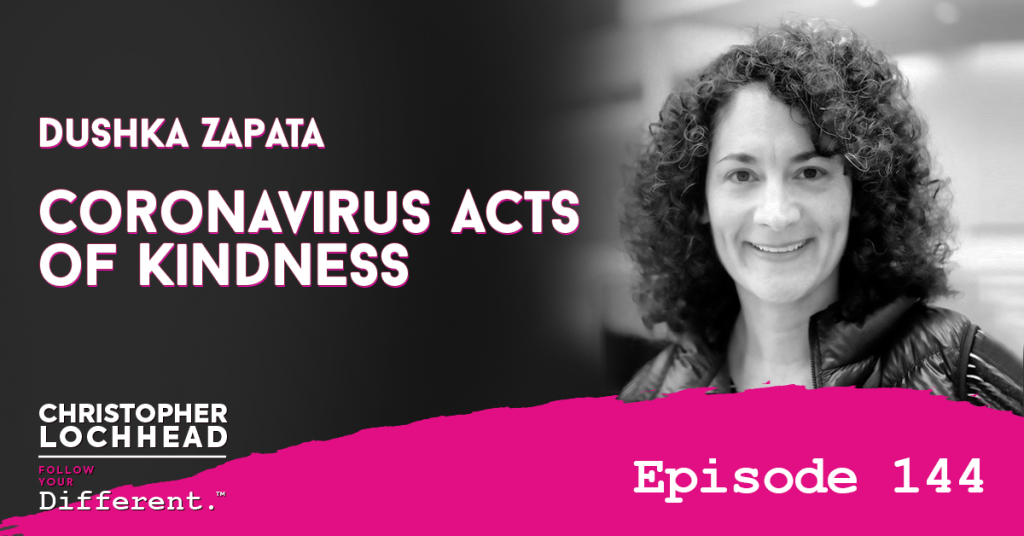
Podcast: Play in new window | Download (Duration: 37:26 — 25.7MB) | Embed
Subscribe: Apple Podcasts | Spotify | Pandora | RSS | More
We continue our run of legendary authors. Today, one of the most prolific and important writers in the world, Dushka Zapata. Her work has been viewed over 157 million times on question & answer site Quora.
In this episode, we get right into how she’s dealing with the coronavirus. Dushka has a powerful point of view on Social Distancing and why we should be conducting our selves as if we already had it. She also touches on why we need to learn to become “elastic” and how we’re all connected.
Living in Uncertainty
Dushka is exactly what we all need right now! She shares how to deal with uncertainty, especially in the present time. People have been looking outwardly too much and she says this is not helping them.
“We are looking for answers in other people and the fact is, no one has the answers. I think that’s really interesting because you forget that you can look within for certain things. Like managing your anxiety and managing the fear of scarcity, which is one of the things that, we are wired to be fearful of.” – Dushka Zapata
Acts of Kindness
Dushka reads to us something that she wrote on Quora about acts of kindness in times of coronavirus.
“In my first supermarket visit, the shelves that carried cans, crackers, toilet paper, were completely empty
People around me were clearly on edge. Stressed, anxious, haphazardly grabbing things from shelves and throwing them into their carts.
I wanted to buy dishwasher detergent and there was one left but I couldn’t reach it. I suddenly felt a sense of powerlessness rise inside of me.
That’s when I saw that the box I had been reaching for was right in front of my eyes. I took it, then realized a very tall person was handing it to me.
“It looks like you wanted this, yes?” he says this to me very gently.
I turn and we just stand there looking at each other, a pause in the middle of a frenzy spinning around us. He smiles at me. His smile feels like someone just dropped a sturdy anchor in the middle of a turbulent ocean.
The times we are living in are surreal. Please, stop and be nice to someone.” – Dushka Zapata
Kindness and Elasticity
Dushka thinks the current pandemic has enabled people to show their best and worst. She cites how people have frenzied over grocery stocks while some other people have also been extra careful and friendly to others.
“One of the things that fascinate me about these kinds of times: one is kindness, that I want to talk about and just like thinking of other people and the other is, the ability to be elastic, flexible. How are you adapting what you’re doing to survive.” – Dushka Zapata
To hear more about kindness and elasticity and Dushka’s point of view on social distancing, download and listen to this episode.
Bio:
Dushka Zapata is one of the most prolific and popular writers working today.
On question and answer site Quora her work has been viewed over 157 million times.
She’s the author of eight best-selling books.
Dushka has over 20 years experience as a senior communications executive in Silicon Valley.
When she’s not writing, she works as a serves as communications executive in San Fransciso.
Links:
Love Yourself: and Other Insurgent Acts That Recast Everything
You Belong Everywhere: and Other Things You’ll Have to See for Yourself
We hope you enjoyed this episode of Follow Your Different™! Christopher loves hearing from his listeners. Feel free to email him, connect on Facebook, Twitter, Instagram and subscribe on iTunes!
143 Why Less Is So Much More w/ Courtney Carver Project 333 Author
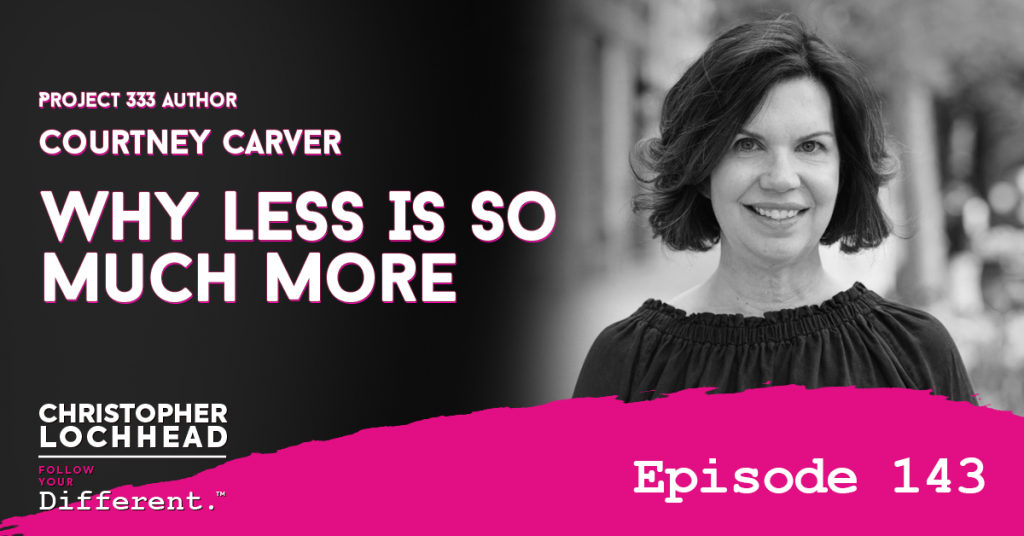
Podcast: Play in new window | Download (Duration: 51:04 — 35.1MB) | Embed
Subscribe: Apple Podcasts | Spotify | Pandora | RSS | More
We continue our run of legendary authors with Courtney Carver, author of Soulful Simplicity and the brand new Project 333.
We talk about The Project 333 Challenge, wearing only 33 items of clothing for three months. People who do this report less anxiety and more clarity and focus. We also talk about how to live a more simple life, why having tons of stuff doesn’t make us happy and how easy it is to slide into the mentality of buying stuff that doesn’t make us happy.
You Are What You Wear
Courtney starts off sharing how both men and women give a lot of attention to their wardrobes. She taps on people who have either overshopped or have thought about other people judging them based on what they wear.
“Whatever it is, we all have this connection to our clothes.” – Courtney Carver
Christopher shares that although he doesn’t pay much attention to his wardrobe, he does have a 20 year old Prada suit sitting around in the closet. He is unsure of the reason why he is still keeping it but reading Courtney’s book made him think about it.
Fueling Anxieties
Courtney shares in one way or another, most of us have purchased clothing to make us look successful or to fit into a specific circle. In fact, in one social activity, Courtney asks for a show of hands asking about their clothes with tags. Half of the room says they do own some unworn and brand new, with tags.
“I think it comes from an obsession with getting a great deal. So we might buy something just because its a good deal when the only good part of the deal is the money part. We never really wanted it in the first place. We might also buy it because we think we need it or should have it, to measure up to the people around us, and our work, and in our day to day lives.” – Courtney Carver
Project 333
Courtney described Project 333 as a “fascinating, emotional ride, digging into closets and wardrobes.” It initially started as a personal challenge to mix and match 33 articles of clothing for 3 months. A few fashion bloggers participated in the challenge and it went viral. Soon enough, Associated Press picked up the story.
“I had no idea until I got rid of most of my stuff. I had no idea how emotional it was for me because I was just really used to it all the time. I was used to seeing tags, I was used to understanding at some level that I spent way too much money on things that I don’t wear or enjoy and they were making me feel bad every single day.” – Courtney Carver
To hear more about Project 333 and how a life-changing disease became a catalyst for radical, positive change in Courtney’s life, download and listen to this episode.
Bio:
Courtney Carver was an Ad Sales Director for a group of luxury magazines. She was in debt, she worked all the time and she was stressed out.
Then, in 2006, she was diagnosed with Multiple Sclerosis and was forced to look at her life habits.
She started by changing her diet and ended by quitting her job and getting rid of the vast majority of her belongings.
The results: She is happier, calmer and hasn’t had any MS symptoms in the last four years.
Courtney Carver is the writer and founder of Be More with Less. The 43-year-old wife and mother launched her blog in May 2010 to share a message of hope in simplicity.
She left a 15-year career in sales and marketing in September 2011 to focus on writing, develop new ways to teach others to live more simply, and live a simpler life herself.
In addition to bemorewithless.com, she created bemorewithless.com/business to encourage business owners and entrepreneurs to focus on the essential instead of getting lost in busy work.
Courtney was diagnosed with Multiple Sclerosis in 2006 and attributes her healthy lifestyle to simplifying every part of her life, from diet to debt.
She moved from New England in 2004 to Salt Lake City where she lives with her husband and 17-year-old daughter.
Links:
We hope you enjoyed this episode of Follow Your Different™! Christopher loves hearing from his listeners. Feel free to email him, connect on Facebook, Twitter, Instagram and subscribe on iTunes!
142 Extreme Life, Extraordinary Meaning w/ Marine Combat Vet Akshay Nanavati
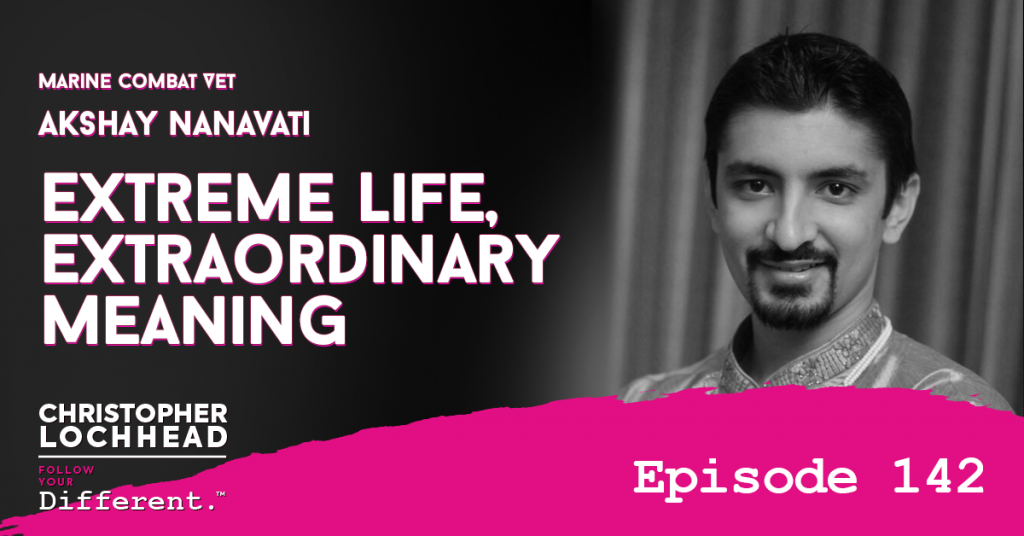
Podcast: Play in new window | Download (Duration: 1:25:01 — 58.4MB) | Embed
Subscribe: Apple Podcasts | Spotify | Pandora | RSS | More
Welcome to an amazing episode with Combat Veteran and US Marine Akshay Nanavati. He’s a speaker, entrepreneur, ultra runner, non-profit founder and best selling author.
We have a stunning conversation about why overcoming extraordinary challenges is the key to a successful life, why we should all pick worthy struggles and the power of “earning your life.” Further, we also touch on why the most important skill is having a positive relationship to suffering and so much more.
Body Not Built For Combat
Standing at 5”7’and weighing just 138 pounds, Akshay enlisted himself to join the Marines. He was a druggie and an alcoholic at the time when he watched the movie Black Hawk Down. It triggered something within him and in a snap, he found himself reading military books and life in combat genres.
It was also shortly after the 9/11 tragedy that moved him and made him ask question himself.
“What kind of human beings would knowingly put themselves in a situation like that and sacrifice their lives for somebody else?” – Akshay Nanavati
True Calling To Serve
Akshay sharest to Christopher that he felt at that time that he was called to serve. Nothing can stop him, even his pre-existing conditions such as depression, self-destructive tendencies, blood disorder, scoliosis, flat footedness and much more.
“It took me about a year and a half to take in all these medical waivers, but that was the turning point. That is why I wanted to join, to serve an institution where the good of the group matters more than you, the well being of the group. You serve for the people next to you and everything is your men and the mission and that’s beautiful.” – Akshay Nanavati
Experiencing Humanity at Extremes
Akshay shares his inner desire to go back in his previous assignment because there was something intriguing, unusual and beautiful when you experience humanity in its most extreme form.
“I mean, part of it is an addictive thing, part of it, you cannot experience and understand and taste the human experience at its fullest, unless you experience it at the most extremes.” – Akshay Nanavati
His experiences led him to write his book, Fearvana. The Dalai Lama endorsed his book, saying “Fearvana inspires us to look beyond our own agonizing experiences and find the positive side of our lives.”
To hear more on Akshay’s thoughts on self-development like: “follow your passion” and more about his book, Fearvana, download and listen to this episode.
Bio:
Akshay Nanavati (born October 15, 1984) is a United States Marine veteran, speaker, entrepreneur, ultra runner and author.
He served in Iraq during Operation Iraqi Freedom and was later diagnosed with post traumatic stress disorder. His book Fearvana was endorsed by the Dalai Lama and Jack Canfield.
Links:
141 The Real DEA Narcos Javier Peña & Steve Murphy Part 2
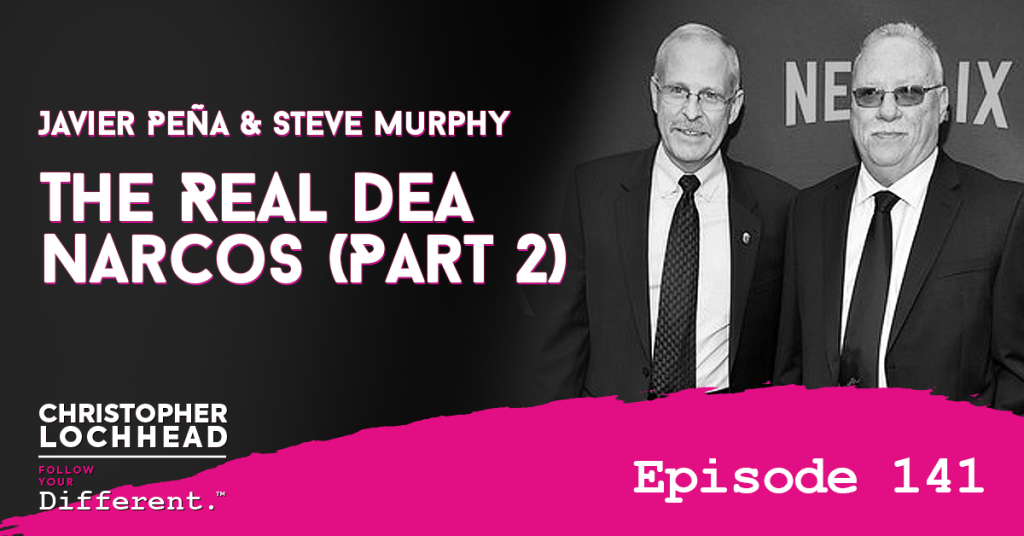
Podcast: Play in new window | Download (Duration: 1:15:08 — 34.4MB) | Embed
Subscribe: Apple Podcasts | Spotify | Pandora | RSS | More
Welcome to part two of our dialogue with the real DEA Narcos Javier Peña and Steve Murphy. These are the two real American heroes who partnered with Colombian Law Enforcement to take down the world’s 1st Narco Terrorist, Pablo Escobar, and their story is the basis for the Netflix smash hit Narcos.
In this second episode, you hear the conclusion of how Murph and Javier bring Escobar to justice. We also dig into their thoughts on leadership, management, and life.
The End of Pablo Escobar
In this riveting conversation, we hear about how Murph and Javier bring Pablo Escobar to his end. They were honest enough to say it was a story of revenge, especially thinking about how many innocent people were killed, some are personal friends of the two .
Javier further recounted what transpired the moment Pablo got out of prison in 1991. They had a bounty of 5 million USD to take him down. Eventually, through the initiatives of the Columbian National Police, Pablo Escobar faced his death.
“If you watch the show Narcos, the part that I was on the roof when Pablo was killed, that’s not true, that’s Hollywood. That night, we were expecting retaliation attacks because of the death of Pablo. It was the quietest night I have even spent. I mean, there was nothing. It was quiet. The next day, Javier was back in the country.” – Steve Murphy
Narcos Netflix Series
Javier and Murph, in all of their appearances, wants to get the record straight that the Columbian National Police was the one who took down Pablo Escobar. The two also share how some of the scenes in Narcos were made dramatic. There were a lot of fictional events that were added to the stories to appeal to the audiences.
It was surely effective because the show was embraced not only in the US but in Europe, Australia, Asia and even in Latin America.
“The writers, directors are phenomenal. They are extremely intelligent. When I get to the writer’s room at Hollywood to work with them, they had a library of books there. I thought I knew everything about Escobar and the cartel, they had books that I never even heard of.” Javier Pena
On Leadership and More
Javier and Murph had some interesting thoughts on life, leadership and more. For instance, Javier shared the importance of going on the field and listening to the field men who report their surveillance first hand.
“When I retired, one of my men says, ‘Boss, I respected you because you went on the field with us’ even though I’m in the background.” Javier Pena
To hear more about the real DEA narcos Javier Pena and Steve Murphy, download and listen to this episode.
Bio:
You may have seen TV shows and documentaries, or read books about the world’s wealthiest, and most violent drug trafficker, but now you have the opportunity to hear the real story of what happened in the investigation of Pablo Escobar and the Medellin Cartel.
DEA special agents Javier Peña and Steve Murphy were assigned as the lead investigators targeting Escobar and his organization.
These true American heroes provide a first-hand lesson in history as they discuss their efforts bringing down the world’s first narco-terrorist, the challenges they faced in oftentimes hostile and life-threatening environments, and the innovative strategies they employed to successfully end the reign of terror of the world’s most wanted criminal.
Their presentation is followed by a Q&A opportunity during which Javier and Steve will entertain questions related to their investigation, the making of Narcos, what history changing investigation is next for them, and more.
Links:
We hope you enjoyed this episode of Follow Your Different™! Christopher loves hearing from his listeners. Feel free to email him, connect on Facebook, Twitter, Instagram and subscribe on iTunes!
141 The Real DEA Narcos Javier Peña & Steve Murphy Part 1
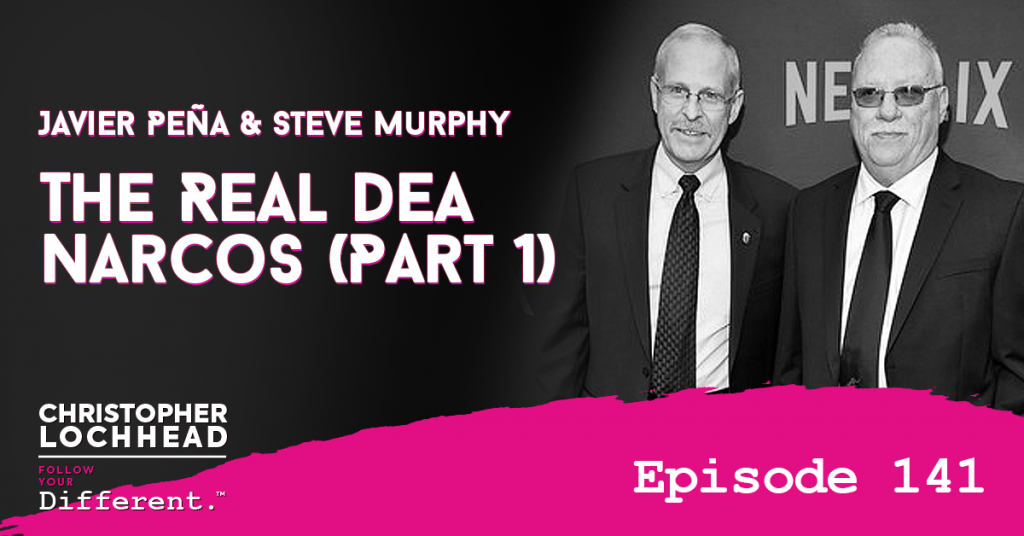
Podcast: Play in new window | Download (Duration: 1:00:35 — 27.7MB) | Embed
Subscribe: Apple Podcasts | Spotify | Pandora | RSS | More
Welcome to our super, special two-part dialogue with the real DEA Narcos Javier Peña and Steve Murphy. In this first episode, they take us behind the scenes of how they came together, from the US to Columbia, and worked for six years, to get Pablo Escobar.
We learn, what it feels like to have a $300,000 bounty on your head and how they dealt with the emotional ups and downs of this long-term, often very lonely and of course extraordinarily dangerous mission.
Street Deals to Cartels
Javier and Steve are two real American heroes who partnered with Colombian Law Enforcement to take down the world’s 1st Narco Terrorist, Pablo Escobar. Their story is actually the basis for the Netflix smash hit Narcos.
Javier recounts how he used to work in Austin Texas, where he runs after street dealers. From street buys to surveillance, he never expected he will be sent to Columbia. It has been months before their superiors transferred them to handle the cartels and Pablo Escobar.
“Pablo Escobar is one of the richest traffickers in the world. He built his empire on terrorism, on violence and its something we had never seen before. This is why we weren’t really ready when we started going after Escobar, cause we had never seen this type of tactics before.” – Javier Peña
Narcoterrorism
Javier and Steve recounted this different kind of terrorism that promulgated in Columbia. Pablo Escobar had orchestrated car bombs, which ranged from 10-15 a day which slowly escalated to 50 per day.
“He wanted to kill as many innocent people as he could because this was his fight against Columbia. We try to explain that he challenged his country and we like to say that he actually won.” Steve Murphy
He also had a bounty on the head of police officers. In fact, the DEA agents caught a 15-year old hitman who shot 10 police officers. The kid took home 100 USD per police officer he kills and he was able to feed and provide shelter to his impoverished family.
Listen to how Murph and Javier had to bend and break the rules and why they think the courage of the Colombian people and why they think their partners in Colombian Law Enforcement ate the “real heroes.” You’re also going to hear in their voices, the powerful bond, and friendship that has developed between them.
In part two, you’ll hear the dramatic conclusion of how they ultimately brought Escobar to justice. We also dig into their life and leadership lessons. We touch on their book, Manhunters and their lives today as public speakers and teachers.
To hear more about the real DEA narcos Javier Pena and Steve Murphy, download and listen to this episode.
Bio:
You may have seen TV shows and documentaries, or read books about the world’s wealthiest, and most violent drug trafficker, but now you have the opportunity to hear the real story of what happened in the investigation of Pablo Escobar and the Medellin Cartel.
DEA special agents Javier Peña and Steve Murphy were assigned as the lead investigators targeting Escobar and his organization.
These true American heroes provide a first-hand lesson in history as they discuss their efforts bringing down the world’s first narco-terrorist, the challenges they faced in oftentimes hostile and life-threatening environments, and the innovative strategies they employed to successfully end the reign of terror of the world’s most wanted criminal.
Their presentation is followed by a Q&A opportunity during which Javier and Steve will entertain questions related to their investigation, the making of Narcos, what history changing investigation is next for them, and more.
Links:
We hope you enjoyed this episode of Follow Your Different™! Christopher loves hearing from his listeners. Feel free to email him, connect on Facebook, Twitter, Instagram and subscribe on iTunes!
140 Built, Not Born w/ Self-Made Billionaire Tom Golisano, Founder Paychex
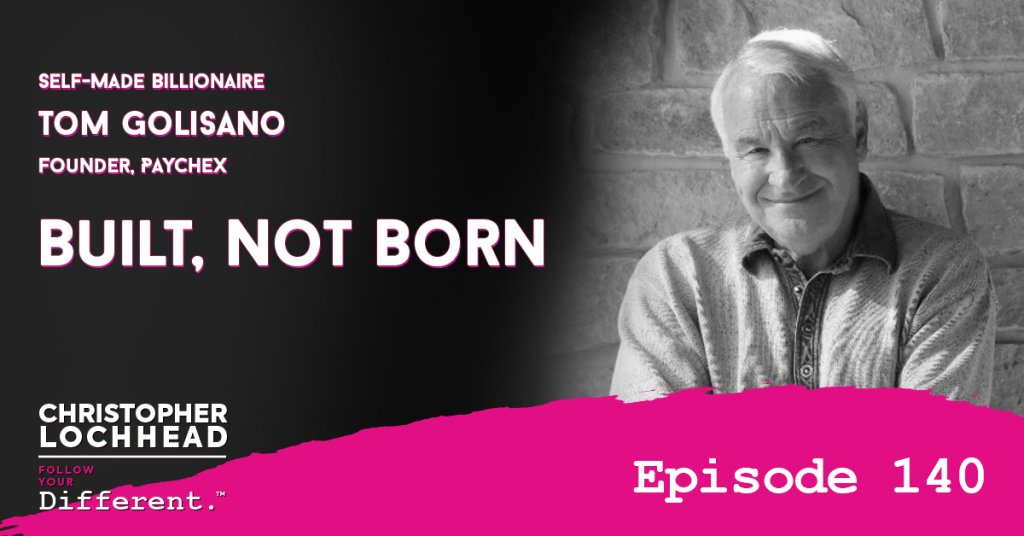
Podcast: Play in new window | Download (Duration: 38:09 — 17.5MB) | Embed
Subscribe: Apple Podcasts | Spotify | Pandora | RSS | More
Today, we speak with self-made Billionaire, Founder of $30B market cap, Paychex. You’re gonna love this guy! He has a new book: Built, Not Born: A Self-Made Billionaire’s No-Nonsense Guide for Entrepreneurs. We dig into the book and his insights on why and when you start a company. He also talks about how to build a long-term, successful business and what important steps to take before marriage.Encourager of Entrepreneurs
Tom found himself as an encourager of entrepreneurs. He understood why people evaluate whether they want to become an entrepreneur or not. He knew that there are a lot of things to take into account, such as risk and hardships exclusive to entrepreneurship. As risks would be evident in any career, Tom shares that sometimes it is even riskier to work for somebody than it is to be your own entrepreneur. Besides, a business can serve as an heirloom or an asset that one can resell.“If your business concept is well thought off, and you are very well qualified to run your little company, your medium-sized company, whatever. then I think that’s the best of both worlds.” – Tom Golisano
Wise Words For Entrepreneurs
Aside from a winning concept for an enterprise, Tom shares entrepreneurs must have industry knowledge. Before launching Paychex, he used to sell accounting machines while working for a payroll processing company that caters to large corporations. He believes this industry knowledge affected his success.“Anybody who is considering being an entrepreneur, the first thing that I would ask is ‘what’s your industry knowledge?’ You know about this industry, you’re getting into that you could absolutely make a difference or are you gonna end up getting a very serious or costly education because you got into something you really did understand?” – Tom Golisano
Sales Management is a Must
For Tom, Sales management is one of the biggest issues with entrepreneurs. Most entrepreneurs mask the issue, saying its a “cashflow problem” but in reality, the company is not making enough sales. Tom advises entrepreneurs to start making calls and to immerse themselves as much to learn about the sales process.“You’re not gonna be able to develop a good sales team unless you have that knowledge yourself. You might as well dig right into it. start making sales presentations and sales calls, and if you still don’t think you’re the right person to be doing that, at least you’ll be in the position to train somebody you hire to perform that function.” – Tom GolisanoTo hear more about Tom’s stories about what it’s like being married to Tennis Legend, Monica Seles, philanthropy, investment strategy and many more, download and listen to this episode.

